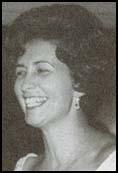Janet Leddy

Janet Graham married Raymond Leddy, a senior figure in the Central Intelligence Agency while he was serving in Venezuela. Over the next few years she gave birth to five children.
In 1957 Leddy was sent to Mexico City as chief political officer as the US Embassy. This enabled him to renew his friendship with Winston Scott, who was now CIA's station chief in Mexico. The two men had been together in Cuba during the Second World War.
Janet Leddy became close friends with Scott's wife, Paula Murray Scott. However, in 1961 Janet began an affair with Winston Scott. When discovered what was going on, Raymond Leddy took a job at the Army War College in Carlisle, Pennsylvania. Brian Bell, who worked under Leddy: "It was too bad because he was one of the most competent political officers I ever met in the Foreign Service."
Paula Murray Scott also discovered about the affair and began drinking heavily. On 12th September, 1962, Paula was found dead in her home. Her death certificate said that she had died of a "heart attack intestinal tuberculosis". As Jefferson Morley points out: "That contradictory diagnosis was not what a physician would have written. Paula did have intestinal tuberculosis, but such a condition could not have caused death." Later evidence emerged that suggested that she either committed suicide or was murdered. Whatever happened, Scott would have had little difficulty in arranging for a Mexican doctor to say that his wife died of a heart attack.
Janet Leddy immediately obtained a divorce and in December 1962 became Winston Scott's third wife. One of Paula's friends at the Chapultepec Golf Club commented: "It was like he married the motive." Thomas C. Mann, David Atlee Phillips, Adolfo Lopez Mateos and Diaz Ordaz attended the wedding.
Leddy filed suit against his wife in a Mexican court for "abandonment". He demanded custody of their five children. He also tried unsuccessfully to use his influence in the State Department to have Winston Scott transferred back to the United States.
In June 1969 Richard Helms presented Winston Scott with the Distinguished Intelligence Medal. He was also told he was being moved back to Washington. Scott refused the post and decided to retire from the agency. Bill Broe, the CIA division chief argued that "Win's retirement didn't have anything to do with the events of October 1968."
Winston Scott remained in Mexico City and along with Ferguson Dempster set up a company called Diversified Corporate Services. Dempster remarked: "We established ourselves as consultants for people who wanted to do business in Mexico. However, Thomas C. Mann claimed that Scott was running "his own personal intelligence organization... The Mexicans wanted to use his expertise and knowledge of Mexico, especially the intelligence side of it."
He also wrote a memoir about his time in the FBI, OSS and the CIA. He completed the manuscript, It Came To Little, and made plans to discuss the contents of the book with CIA director, Richard Helms, in Washington on 30th April, 1971. Scott told John Horton, the chief of the CIA station in Mexico City, that he would not be talked out of publishing the book.
Winston Scott died on 26th April, 1971. No autopsy was performed, and a postmortem suggested he had suffered a heart attack. When Anne Goodpasture heard the news of Scott’s death she went straight to James Angleton to tell him that Scott had classified documents in his home safe (Scott had tapes and photos of Oswald).
Angleton visited Scott's wife in Mexico City on 28th April. Michael Scott, Winston Scott's son, told Dick Russell that James Angleton took away his father's manuscript. Angleton also confiscated three large cartons of files including a tape-recording of the voice of Lee Harvey Oswald. Michael Scott was also told by a CIA source that his father had not died from natural causes.
Michael Scott eventually got his father's manuscript back from the CIA. However, 150 pages were missing. Chapters 13 to 16 were deleted in their entirety. In fact, everything about his life after 1947 had been removed on grounds of national security.

